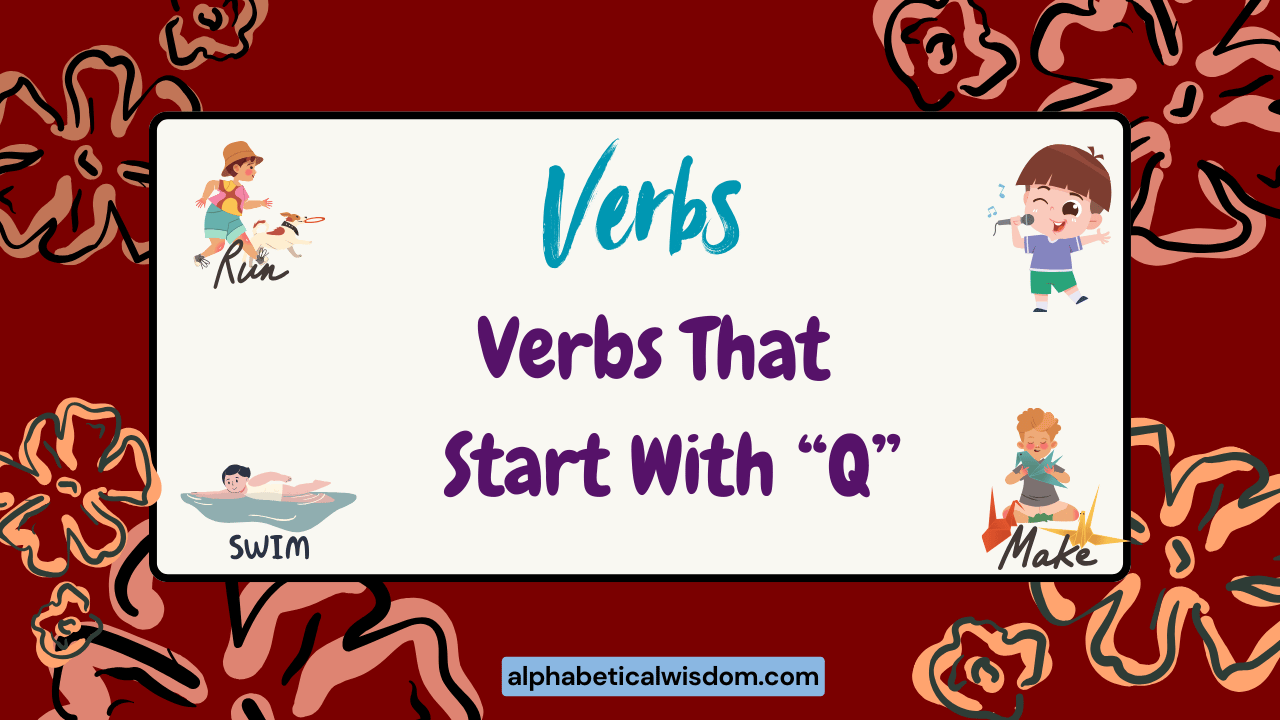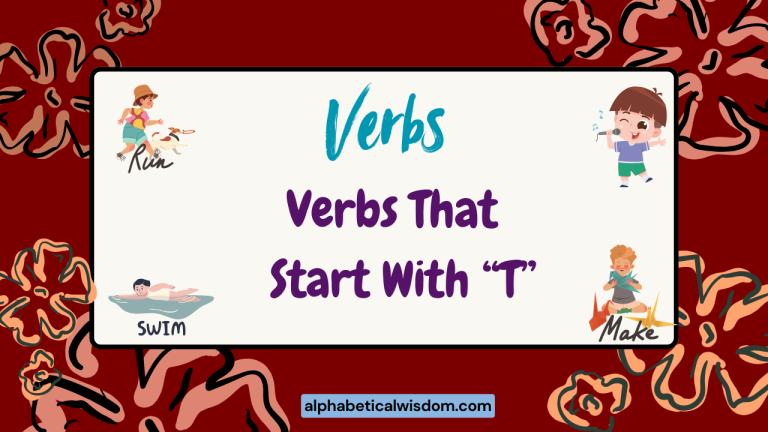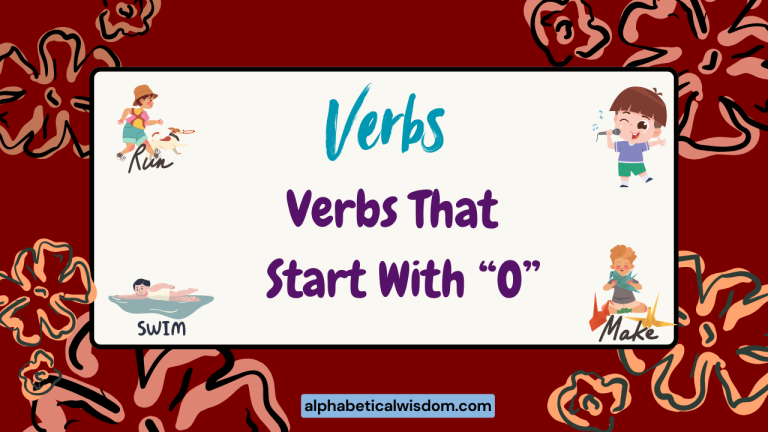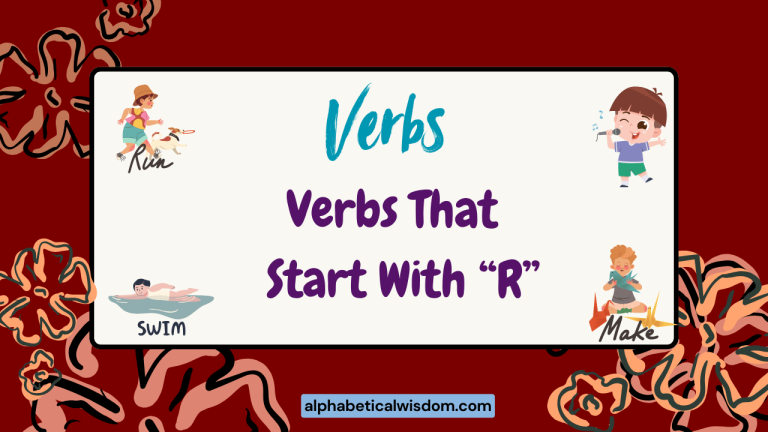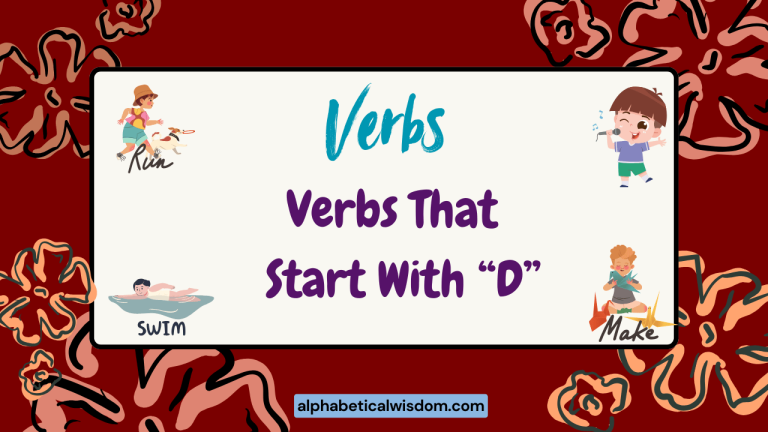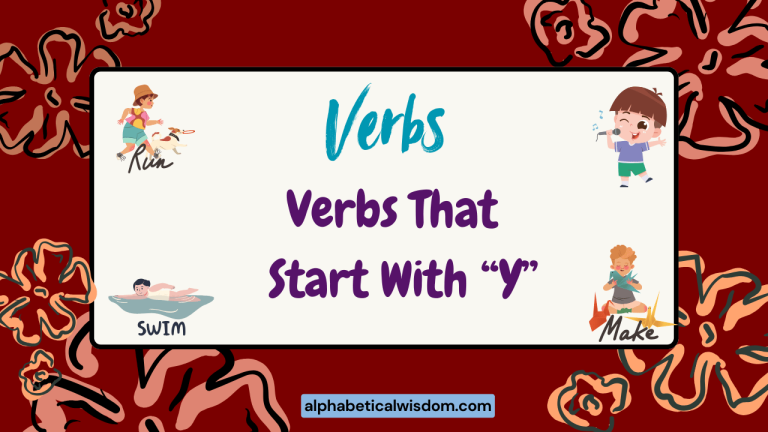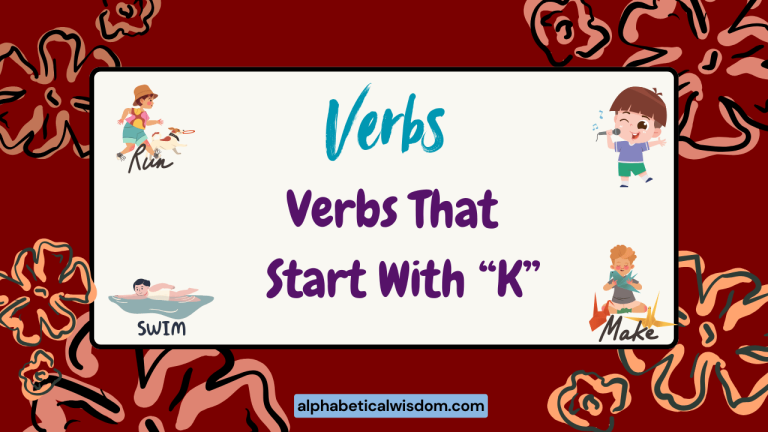Verbs That Start With Q: A Comprehensive Grammar Guide
Understanding the nuances of verbs is crucial for mastering English grammar, and exploring verbs that start with the letter ‘Q’ offers a unique linguistic journey. While not as common as verbs beginning with other letters, these verbs are essential for expressing specific actions and states.
This article provides a detailed exploration of verbs that start with ‘Q,’ their definitions, usage, and practical examples. Whether you are an English language learner, a teacher, or simply someone interested in expanding your vocabulary, this guide will equip you with the knowledge and skills to use these verbs effectively.
Table of Contents
- Introduction
- Definition of Verbs That Start With Q
- Structural Breakdown of Verbs Starting With Q
- Types and Categories of Verbs Starting With Q
- Examples of Verbs That Start With Q
- Usage Rules for Verbs Starting With Q
- Common Mistakes Using Verbs Starting With Q
- Practice Exercises
- Advanced Topics: Nuances and Complex Usage
- Frequently Asked Questions
- Conclusion
Introduction
Verbs are the backbone of any sentence, conveying actions, occurrences, and states of being. While some letters of the alphabet boast a plethora of verbs, the letter ‘Q’ presents a more limited, yet equally important, set.
These verbs, though fewer in number, each carry distinct meanings and usages that contribute to the richness of the English language. This article delves into the world of verbs starting with ‘Q’, providing a comprehensive guide to their definitions, structural patterns, and practical applications.
By understanding these verbs, learners can enhance their vocabulary, improve their writing skills, and communicate more effectively.
Definition of Verbs That Start With Q
Verbs that start with ‘Q’ are action words or state-of-being words that begin with the letter ‘Q’. They function just like any other verb in English grammar, serving as the predicate of a sentence and indicating what the subject does, is, or experiences.
Due to the relatively small number of verbs beginning with ‘Q’, each verb carries significant weight and specific connotations. Understanding their precise meanings and contexts is crucial for accurate and effective communication.
These verbs can be classified into different types based on their function and transitivity, which will be explored further in the following sections.
Classification of Verbs Starting With Q
Verbs starting with ‘Q’ can be classified based on various grammatical properties, including transitivity, verb type (action, linking, auxiliary), and regularity. Transitive verbs require a direct object to complete their meaning, while intransitive verbs do not.
Action verbs describe a specific action, linking verbs connect the subject to a complement, and auxiliary verbs help form different tenses or moods. Regular verbs follow predictable patterns for conjugation, while irregular verbs have unique forms.
Identifying these properties helps in understanding how to use each verb correctly in different contexts.
Function of Verbs Starting With Q
The primary function of verbs starting with ‘Q’ is to express actions, states, or occurrences. They serve as the core of a sentence’s predicate, providing information about the subject.
For instance, the verb “quench” describes the action of satisfying thirst, while “qualify” describes the action of becoming eligible or competent. Understanding the specific function of each verb is essential for constructing grammatically correct and meaningful sentences.
Furthermore, these verbs contribute to the overall tone and style of writing, allowing for precise and nuanced expression.
Contexts of Verbs Starting With Q
The contexts in which verbs starting with ‘Q’ are used can vary widely depending on their specific meaning and connotations. Some verbs, like “question,” are commonly used in everyday conversation and formal writing.
Others, like “quaff,” might be more frequently found in literature or specialized contexts. Recognizing the appropriate context for each verb is crucial for effective communication.
Consider the audience, purpose, and tone of the communication when choosing a verb starting with ‘Q’. This ensures that the message is conveyed accurately and appropriately.
Structural Breakdown of Verbs Starting With Q
The structural breakdown of verbs starting with ‘Q’ involves understanding their basic forms, tenses, and conjugation patterns. Like all English verbs, verbs starting with ‘Q’ have a base form, past tense form, past participle form, and present participle form.
Regular verbs follow predictable patterns for forming these tenses, while irregular verbs have unique forms that must be memorized. Understanding these structural elements is essential for using verbs starting with ‘Q’ correctly in different tenses and sentence structures.
Basic Forms of Verbs Starting With Q
The basic forms of verbs starting with ‘Q’ include the base form (infinitive without “to”), the past tense form, the past participle form, and the present participle form. The base form is used in the present tense (except for the third-person singular), the future tense, and with modal verbs.
The past tense form indicates an action that occurred in the past. The past participle form is used with auxiliary verbs to form perfect tenses.
The present participle form is used with auxiliary verbs to form continuous tenses. Knowing these forms is fundamental for accurate verb usage.
Tense and Conjugation of Verbs Starting With Q
Conjugating verbs starting with ‘Q’ involves changing their form to indicate tense, person, and number. The present tense form varies depending on the subject (e.g., “I question,” “he questions”).
The past tense form is typically formed by adding “-ed” to the base form for regular verbs. The future tense is formed using “will” or “shall” followed by the base form.
Understanding these conjugation patterns is essential for constructing grammatically correct sentences in different tenses. Irregular verbs, however, require memorization of their unique forms.
Types and Categories of Verbs Starting With Q
Verbs starting with ‘Q’ can be categorized based on their transitivity (transitive or intransitive), their function (action, linking, or auxiliary), and their regularity (regular or irregular). Transitive verbs require a direct object to complete their meaning, while intransitive verbs do not.
Action verbs describe specific actions, linking verbs connect the subject to a complement, and auxiliary verbs help form different tenses or moods. Regular verbs follow predictable patterns for conjugation, while irregular verbs have unique forms that must be memorized.
Understanding these categories helps in using each verb correctly in different contexts.
Transitive vs. Intransitive Verbs Starting With Q
Transitive verbs require a direct object to receive the action, while intransitive verbs do not. For example, “question” can be transitive (e.g., “He questioned the witness”) or intransitive (e.g., “Don’t question my authority”).
Identifying whether a verb is transitive or intransitive is crucial for constructing grammatically correct sentences. Using a transitive verb without a direct object or an intransitive verb with one can lead to grammatical errors and unclear communication.
Action, Linking, and Auxiliary Verbs Starting With Q
Action verbs describe a specific action, linking verbs connect the subject to a complement, and auxiliary verbs help form different tenses or moods. While verbs starting with ‘Q’ are primarily action verbs, understanding these distinctions is important for overall verb knowledge.
Action verbs, such as “quench,” describe a specific action performed by the subject. Linking verbs connect the subject to a noun or adjective that describes or identifies it.
Auxiliary verbs, such as “have” or “be,” help form different tenses or moods.
Examples of Verbs That Start With Q
This section provides extensive examples of verbs that start with ‘Q,’ organized by category and usage. Each example is designed to illustrate the verb’s meaning and how it is used in a sentence.
These examples cover a range of contexts, from everyday conversation to formal writing, helping learners understand the nuances of each verb. By studying these examples, learners can improve their vocabulary, enhance their writing skills, and communicate more effectively.
Examples of “Qualify”
The verb “qualify” means to be entitled to a particular benefit or privilege by fulfilling a necessary condition; to become officially recognized as being trained to perform a particular job; or to make a statement or assertion less absolute. The following table provides examples of “qualify” used in various contexts.
| Sentence | Explanation |
|---|---|
| She needs to qualify for the race. | Indicates the need to meet the requirements to participate in the race. |
| He qualified as a doctor last year. | Shows that he has completed the necessary training to become a doctor. |
| I want to qualify my statement. | Suggests the speaker wants to add conditions or limitations to what they said. |
| Do you qualify for the discount? | Asks if the person meets the criteria for the discount. |
| The team qualified for the finals. | Indicates that the team has earned a spot in the final competition. |
| She is trying to qualify her research findings. | Suggests she is trying to provide context and limitations to her research. |
| You must qualify before you can compete. | Emphasizes the importance of meeting the requirements before competing. |
| He didn’t qualify for the scholarship. | Shows that he didn’t meet the criteria for the scholarship. |
| I need to qualify my support for the project. | Implies that the speaker’s support is conditional. |
| They qualified easily for the next round. | Indicates that they met the requirements without difficulty. |
| She hopes to qualify as an architect. | Shows her aspiration to complete the training to become an architect. |
| He tried to qualify his earlier remarks. | Suggests he attempted to clarify or limit his previous statements. |
| Did you qualify for the loan? | Asks if the person met the criteria for the loan. |
| The athlete qualified for the Olympic team. | Indicates that the athlete earned a spot on the Olympic team. |
| She wanted to qualify her positive review. | Suggests she wanted to add some reservations to her positive assessment. |
| You have to qualify to enter the contest. | Emphasizes the need to meet the requirements to participate in the contest. |
| He failed to qualify for the job. | Shows that he didn’t meet the criteria for the job. |
| I will qualify my statement with more details. | Implies that the speaker will provide more context to their statement. |
| They qualified despite the difficult conditions. | Indicates that they met the requirements even under challenging circumstances. |
| She plans to qualify as a lawyer. | Shows her intention to complete the training to become a lawyer. |
| He needed to qualify his initial enthusiasm. | Suggests he needed to temper his initial excitement. |
| Do I qualify for the senior discount? | Asks if the person meets the age criteria for the senior discount. |
| Our team qualified for the playoffs. | Indicates that the team has earned a spot in the playoff competition. |
| She tried to qualify her earlier assessment. | Suggests she tried to clarify or limit her previous assessment. |
| You must qualify to participate in the study. | Emphasizes the need to meet the requirements to participate in the study. |
| He didn’t qualify for the promotion. | Shows that he didn’t meet the criteria for the promotion. |
Examples of “Question”
The verb “question” means to ask someone questions, typically in an official context; to doubt the truth or accuracy of something. The following table provides examples of “question” used in various contexts.
| Sentence | Explanation |
|---|---|
| The police questioned the suspect. | Indicates that the police asked the suspect questions. |
| I question his motives. | Shows doubt about his reasons or intentions. |
| Don’t question my authority. | Implies that the speaker’s authority should not be doubted. |
| She questioned the validity of the data. | Shows doubt about the accuracy of the data. |
| He questioned the witness. | Indicates that he asked the witness questions. |
| They questioned the decision. | Shows doubt or disagreement about the decision. |
| We need to question the assumptions. | Suggests that the assumptions should be examined critically. |
| She questioned her own abilities. | Indicates that she doubted her own skills. |
| He questioned the reliability of the source. | Shows doubt about the trustworthiness of the source. |
| They questioned the need for the change. | Shows doubt or disagreement about the necessity of the change. |
| She was questioned about her whereabouts. | Indicates that she was asked about where she was. |
| I question the wisdom of this approach. | Shows doubt about the prudence of this method. |
| You shouldn’t question their judgment. | Implies that their judgment should be trusted. |
| He questioned the evidence presented. | Shows doubt about the validity of the evidence. |
| She questioned the fairness of the system. | Indicates that she doubted the impartiality of the system. |
| They questioned the feasibility of the plan. | Shows doubt about the practicality of the plan. |
| He questioned the success of the project. | Indicates that he doubted the success of the project. |
| She questioned his honesty. | Shows doubt about his truthfulness. |
| I question the accuracy of the report. | Shows doubt about how accurate the report is. |
| He questioned the statement. | Indicates that he doubted the statement. |
| She questioned the data. | Shows doubt about the data. |
| We questioned the reliability. | Indicates that we doubted the reliability. |
| They questioned the results. | Shows doubt about the results. |
| You questioned the evidence. | Indicates that you doubted the evidence. |
| He questioned his skills. | Shows doubt about his skills. |
Examples of “Quench”
The verb “quench” means to satisfy (one’s thirst) by drinking; to extinguish (a fire). The following table provides examples of “quench” used in various contexts.
| Sentence | Explanation |
|---|---|
| The water quenched my thirst. | Indicates that the water satisfied the speaker’s thirst. |
| They quenched the fire quickly. | Shows that they extinguished the fire rapidly. |
| Nothing could quench his desire for knowledge. | Implies that his pursuit of knowledge was insatiable. |
| She quenched her thirst with lemonade. | Shows that she satisfied her thirst with lemonade. |
| The rain quenched the parched earth. | Indicates that the rain relieved the dryness of the earth. |
| He tried to quench his curiosity. | Suggests he attempted to satisfy his curiosity. |
| The firefighters quenched the blaze. | Shows that the firefighters extinguished the fire. |
| She quenched her hunger with a sandwich. | Indicates that she satisfied her hunger with a sandwich. |
| The news quenched their hopes. | Implies that the news dashed their hopes. |
| He quenched his thirst after the race. | Shows that he satisfied his thirst after the race. |
| She wanted to quench the rumors. | Suggests that she wanted to end the rumors. |
| The ice water quenched his thirst. | Indicates that the ice water satisfied his thirst. |
| He tried to quench his anger. | Shows that he attempted to control his anger. |
| The rain helped to quench the drought. | Indicates that the rain helped relieve the drought. |
| She quenched her anxiety with meditation. | Shows that she relieved her anxiety with meditation. |
| They quenched their thirst at the oasis. | Indicates that they satisfied their thirst at the oasis. |
Examples of “Quip”
The verb “quip” means to make a witty remark. The following table provides examples of “quip” used in various contexts.
| Sentence | Explanation |
|---|---|
| He quipped about the weather. | Indicates he made a witty remark about the weather. |
| She quipped a clever response. | Shows she made a witty and intelligent reply. |
| The comedian quipped throughout the show. | Implies the comedian made witty remarks continuously during the show. |
| He quipped, “That’s what she said.” | Shows he made a quick and humorous remark. |
| She likes to quip during meetings. | Indicates she enjoys making witty remarks during meetings. |
| He quipped about the situation. | Shows he made a witty remark about the situation. |
| The speaker quipped, earning laughter from the audience. | Indicates that the speaker made a witty remark, causing the audience to laugh. |
| She quipped a reply, making everyone chuckle. | Shows she made a witty reply, causing everyone to chuckle. |
Usage Rules for Verbs Starting With Q
The usage rules for verbs starting with ‘Q’ are similar to those for other verbs in English. They must agree with the subject in number and person, and they must be used in the correct tense to convey the intended meaning.
Understanding the specific connotations of each verb is also crucial for effective communication. Pay attention to the context and audience when choosing a verb starting with ‘Q’ to ensure that the message is conveyed accurately and appropriately.
Subject-Verb Agreement With Verbs Starting With Q
Subject-verb agreement requires that the verb agrees with the subject in number and person. Singular subjects require singular verbs, while plural subjects require plural verbs.
In the present tense, most verbs add “-s” or “-es” to the base form when used with a singular third-person subject (e.g., “he questions”). Understanding these rules is essential for constructing grammatically correct sentences using verbs starting with ‘Q’.
Tense Usage With Verbs Starting With Q
Verbs starting with ‘Q’ can be used in all tenses to convey different time frames. The present tense is used for actions happening now or habitual actions.
The past tense is used for actions that happened in the past. The future tense is used for actions that will happen in the future.
Perfect tenses are used to indicate actions completed before a specific time. Continuous tenses are used to indicate actions in progress.
Choosing the correct tense is crucial for conveying the intended meaning accurately.
Common Mistakes Using Verbs Starting With Q
Common mistakes when using verbs starting with ‘Q’ include incorrect tense usage, subject-verb agreement errors, and misunderstanding the specific connotations of each verb. For example, using the past tense form when the present tense is required, or using a singular verb with a plural subject.
Avoiding these mistakes requires careful attention to grammatical rules and a thorough understanding of each verb’s meaning and usage.
Incorrect: He question the decision.
Correct: He questions the decision.
Incorrect: They was questioning the witness.
Correct: They were questioning the witness.
Practice Exercises
These practice exercises are designed to help you reinforce your understanding of verbs starting with ‘Q’. Complete each sentence using the correct form of the verb provided in parentheses.
Check your answers against the solutions provided below.
Exercise 1: Fill in the Blanks
| Question | Answer |
|---|---|
| 1. She needs to _______ for the competition. (qualify) | qualify |
| 2. The police _______ the suspect. (question) | questioned |
| 3. The water _______ my thirst. (quench) | quenched |
| 4. He _______ about the situation. (quip) | quipped |
| 5. They are trying to _______ the fire. (quench) | quench |
| 6. We should _______ the assumptions. (question) | question |
| 7. She is going to _______ as a lawyer. (qualify) | qualify |
| 8. He always _______ during meetings. (quip) | quips |
| 9. I _______ his motives. (question) | question |
| 10. They _______ easily for the final round. (qualify) | qualified |
Exercise 2: Correct the Errors
Identify and correct the errors in the following sentences.
| Question | Answer |
|---|---|
| 1. He question the decision. | He questions the decision. |
| 2. She qualify for the race yesterday. | She qualified for the race yesterday. |
| 3. They was questioning the witness. | They were questioning the witness. |
| 4. It quench his thirst. | It quenched his thirst. |
| 5. He quip a joke. | He quipped a joke. |
| 6. She are qualify for the job. | She is qualifying for the job. |
| 7. They question the reliability of the source last week. | They questioned the reliability of the source last week. |
| 8. We quench our thirst with lemonade. | We quenched our thirst with lemonade. |
| 9. He are quip during the show. | He is quipping during the show. |
| 10. I question her decision tomorrow. | I will question her decision tomorrow. |
Advanced Topics: Nuances and Complex Usage
For advanced learners, understanding the nuances and complex usage of verbs starting with ‘Q’ is essential. This includes exploring idiomatic expressions, figurative language, and subtle differences in meaning between similar verbs.
Additionally, examining the historical context and etymology of these verbs can provide deeper insights into their usage and connotations.
Frequently Asked Questions
- What are some common verbs that start with ‘Q’?
Common verbs that start with ‘Q’ include qualify, question, quench, and quip. These verbs are used in a variety of contexts to express different actions and states.
- How do I conjugate verbs that start with ‘Q’?
Verbs that start with ‘Q’ are conjugated like other English verbs, following the standard patterns for tense, person, and number. Regular verbs add “-ed” to form the past tense and past participle, while irregular verbs have unique forms that must be memorized.
- What is the difference between “question” and “interrogate”?
“Question” generally means to ask someone questions, while “interrogate” implies a more formal and intensive questioning, often used in legal or investigative contexts.
- How can I improve my vocabulary of verbs that start with ‘Q’?
To improve your vocabulary, read widely, pay attention to how these verbs are used in context, and practice using them in your own writing and speaking.
- What are some common mistakes when using verbs that start with ‘Q’?
Common mistakes include incorrect tense usage, subject-verb agreement errors, and misunderstanding the specific connotations of each verb.
- Are there any irregular verbs that start with ‘Q’?
Most verbs starting with ‘Q’ are regular, but it’s always important to double-check and be aware of any potential irregular forms.
- In what contexts is it appropriate to use the verb “quip”?
The verb “quip” is appropriate in informal and humorous contexts where witty or clever remarks are made.
- How does the meaning of “qualify” change depending on the context?
The meaning of “qualify” can change depending on the context. It can mean to meet the requirements for something, to become certified in a profession, or to modify a statement.
Conclusion
Mastering verbs that start with ‘Q’ can significantly enhance your English language skills. While the number of these verbs is limited, their specific meanings and usages are essential for effective communication.
By understanding their definitions, structural patterns, and practical applications, learners can improve their vocabulary, enhance their writing skills, and express themselves more accurately. Remember to pay attention to context, subject-verb agreement, and tense usage to avoid common mistakes and ensure clarity in your communication.
